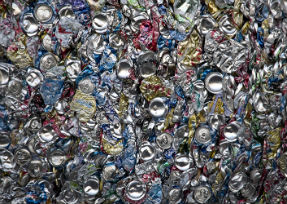Why recycle aluminum cans:
Recycling aluminum cans is an important way to save energy. This is because making a new aluminum can out off recycled aluminum, uses only 5% of the energy taken to manufacture a brand new can. It takes 200 million Btu of energy to manufacture one ton of aluminum for new soda cans. On the other hand using recycled aluminum will use a mere 45 million Btu. Roughly, recycling 54 billion cans can save energy equal to 15 million barrels of crude oil. The energy saved by recycling a pound of aluminum can be used to generate about 7.5 kilowatts of electricity which can meet a midsized family’s electricity needs for at least six years.
Saving resources and raw materials:
Recycling
aluminum helps to save on natural resources by reducing the amount of
raw material that is required in manufacturing. The time taken to
recycle aluminum is considerably lesser than other materials. In fact,
it takes all but 60 days to recycle a beverage can and put it back on
the shelf to be bought again. Today’s aluminum cans are 100% recyclable
and can theoretically be recycled an infinite number of times.
The economic impact of recycling:
Recycling
has an economic impact on society. The aluminum industry pays $800
million for empty recycling cans. This is a testament to the high market
value that recycled aluminum has. Collecting and recycling cans helps
individuals and charitable organizations to earn money. An example is
the 'cans for habitat' program. Cans are collected from drop-off
locations and the revenue generated goes toward the Habitat for Humanity
organization which spends money on building decent and affordable
housing for low income families. In some countries in order to promote
recycling habits shoppers are awarded a refund when they return cans
that are not crushed or ripped.
Recycling aluminum at Berea Kentucky:
The
largest aluminum recycling plant in North America is found at Berea in
Kentucky. The plant has a capacity of recycling six billion cans a year
at a stunning 220 cans every second. The most common contaminants in
aluminum recycling are dirt, moisture, plastic glass and other metals.
In order to be recycled cans are first shredded then a magnet is used to
separate steel and tin for aluminum.
Recycling of aluminum has been increasing over the years as it is a
cost effect and attractive strategy which saves energy and earns money.
...Read more
Close










